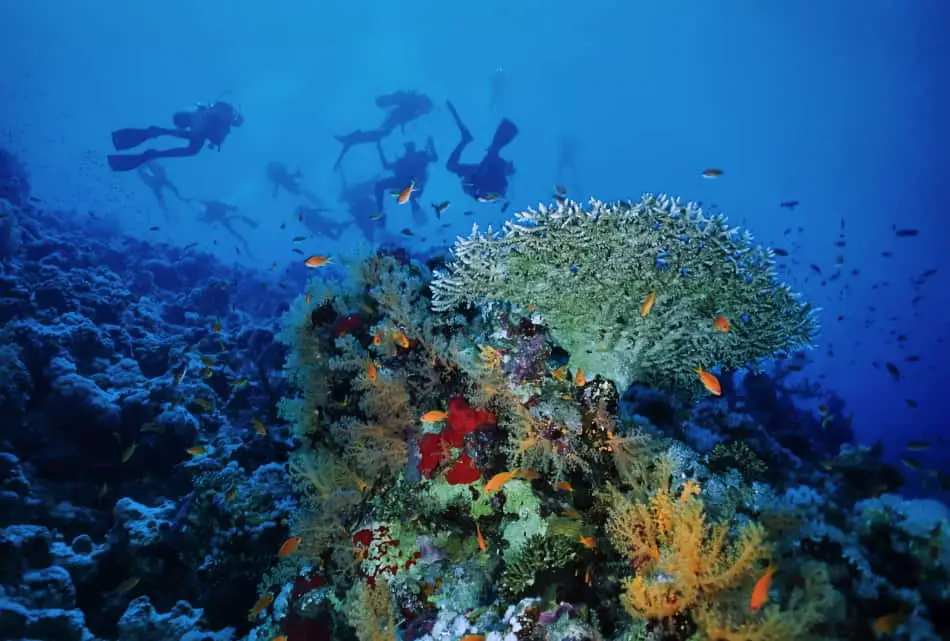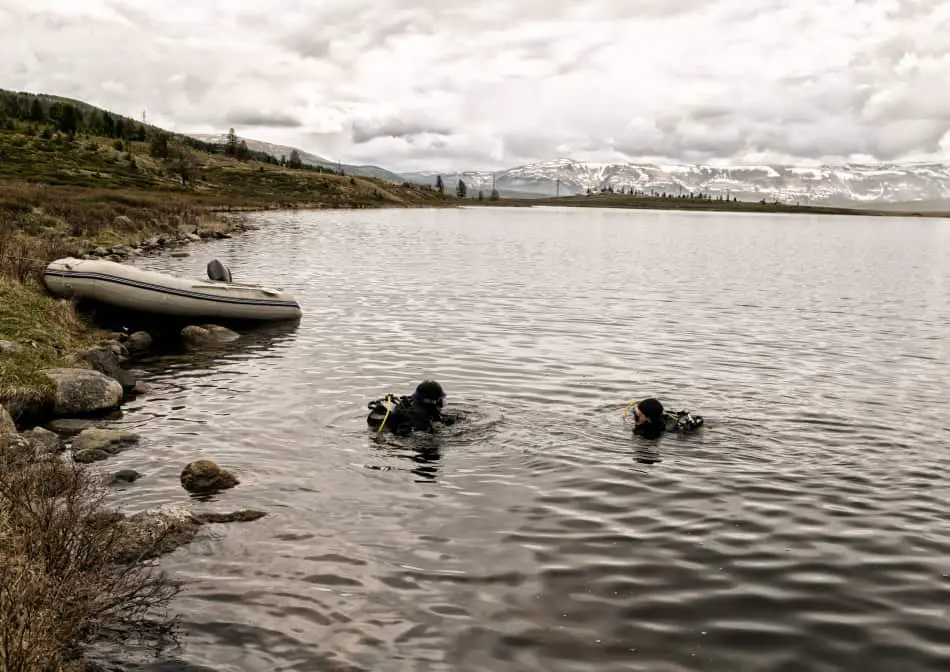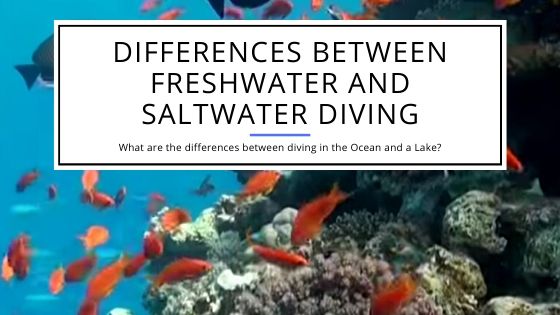Differences Between Freshwater and Saltwater Diving
Freshwater and saltwater are both common diving forms for scuba divers. Typically, factors like the sights divers want to see and the kind of experience they want to have underwater, determine where they are going to go. The difference between saltwater and fresh water is right in the name; salt water is water that has a certain level of salt content, while freshwater is categorized as having less than 1% salt.
Most bodies of water, in fact, 71% of the Earth’s surface is covered by salt water. This includes oceans, seas, some rivers, and saltwater ponds. Only 1% of the Earth’s surface is covered by fresh water; this includes lakes, streams, wetlands, ponds and some rivers. Even though the difference in percentage is drastic, about 41% of fish species live in freshwater.
You might think scuba diving only takes place in saltwater, but freshwater dives are just as exciting and rewarding. In the following, we will discuss all the differences in freshwater and saltwater diving. Keep reading if you want to know more!
Is There A Difference Between Diving in Freshwater Vs. Saltwater?
There are many things to consider when diving in freshwater versus saltwater, and the differences start with the water itself; the dive becomes different because of the nature of the water.
Differences to Be Aware of Before Diving in Freshwater Vs. Saltwater:
Temperature
Freshwater tends to be colder than saltwater.
Buoyancy
Salt water is denser than freshwater, making it harder for divers to achieve neutral buoyancy.
Current
Fresh water has a predictable current, while saltwater can be quite unpredictable.
Marine Life
Saltwater divers have a larger variety and a larger number of marine life, that is more interactive than freshwater.
Type of Dive
Freshwater dives usual entail divers walking into the water while saltwater dives in many cases require taking a boat to the dive site. Exceptions here is if you go shore diving.
Is the Water Pressure the Same Between Freshwater and Saltwater When Diving?
Divers use pressure to determine their depth and how much air they have left in their cylinders. Pressure can also be the cause of many diving injuries, such as lung overexpansion and decompression sickness, to name a couple. This is why it is important for divers to understand the pressure of water and what effect the amount of pressure can have on them.
The difference in pressure between salt water and fresh water comes with the changes in depth. Since saltwater is denser than freshwater, the pressure increases with shorter intervals of depth. Freshwater has slightly less pressure at any given depth than saltwater.

Is Buoyancy Different?
Again, because of the density of saltwater versus fresh water, there is a difference in buoyancy. The reason for the difference in density is extremely simple and easy to explain; if you take two glasses of water, and you dissolve salt into one of them, though the volume of the water won’t increase, the weight will; hence, the density will as well. This is because the salt and water molecules are bonding with each other rather than existing separately.
Objects in salt water are more buoyant than they are in fresh water because of the density. This can be explained through upward and downward force. The upward force is the weight of the object and the downward force is the weight of the water that the object displaces. The two forces work in tandem to determine whether an object in the water floats, sinks or remains suspended. The denser the water is, the more downward force it expels, causing the object (or diver) to float.
Do You Need More Weight in Saltwater?
Since it is so that you are going to be more buoyant in saltwater, it is obvious to assume that you need more weight to remain at neutral buoyancy.
This is a correct assumption. The diver wants the upward force to increase to be able to balance their buoyancy.
Do You Need Different Dive Computer Settings?
If the density of the water around you is changing, your computer needs to know. Some more advanced dive computers have preset options for freshwater or saltwater.
In that case, changing the settings is easy. If not, you need to change the settings of the computer so it knows at what depth periodically the density changes.

Are Currents Different?
Freshwater currents are predictable mainly because they are caused by wind or bottom formations. These currents aren’t too disruptive.
With saltwater, the currents are formed by the different levels of salinity, density, and temperature in a single body of water. The water moves in unpredictable directions and with different forces.
What Different Aquatic Life Can You Expect Between Saltwater and Freshwater Diving?
First and foremost, as a diver, you need to consider those saltwater bodies are much larger than freshwater, making it an obvious assumption that larger fish species are probably only going to be found in saltwater.
There are also many more fish species that live in saltwater and they exist in a lot more density, so you are more likely to see marine life on a saltwater dive over a freshwater dive. Most sharks, rays, and groupers are found in saltwater, but eels and smaller fish species can be found in freshwater dives.
Is Visibility Better in Fresh or Saltwater?
Saltwater usually has better visibility than freshwater. The reason for this is that freshwater usually has denser sand or mud floors, which when moved around, can create a sort of cloudy appearance.
This is because there is little current in freshwater, meaning the particles remain suspended in the water; divers have to be careful while kicking around their fins in freshwater. On the other hand, saltwater has finer sand that settles easily and is helped out by the constant current.
Is It More Dangerous to Dive in The Ocean?
The ocean is a huge body of water with many parts of it completely unknown and anything unknown can hold potential dangers. The ocean is not contained like many freshwater bodies are.
There are also bigger ocean creatures that could be a potential threat, unlike freshwater animals. Since the ocean is larger, deeper and largely unexplored, it is, of course, more dangerous than its smaller, shallower freshwater counterparts.

Do You Need Different Gear Depending on Whether You Dive in Salt or Freshwater?
Since the waters are so different, there is also a need for different gear while diving.
Suits
In freshwater, divers usually opt for dry or semi-dry suits since it can be colder, while in saltwater, they go for wetsuits.
Gloves
Gloves are also used in freshwater dives because of the lower temperature of the water.
Booties
Since freshwater dives are usually started from the shore rather than from a boat, booties are used to protect the feet from the rocks that can be slippery or jagged.
Torch
A torch is required for fresh water dives because the water can tend to be murky and darker than salt water.
It can be tremendously helpful to use a scuba pointer stick in freshwater. The silt and mud at the bottom of the body of water are usually thicker than in saltwater and the stick allows to carefully touch things without reducing visibility too much.
Final Thoughts
If you’re trying to decide what kind of dive you want to go for, just know that there are advantages in going diving in both kinds of water bodies. The experiences and sights are completely different from each other, so if you’ve been diving in one kind of water only, you should give the other one a shot to experience a completely different kind of dive!

